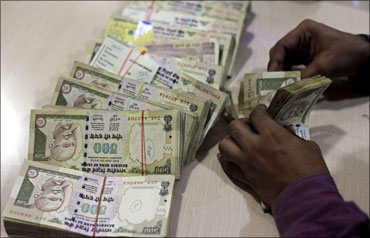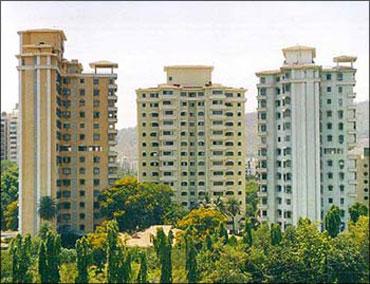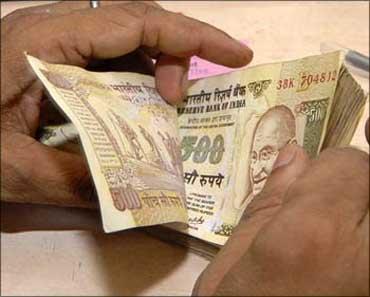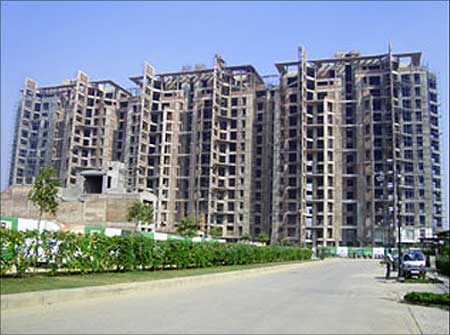
The Reserve Bank of India raised its short-term lending and borrowing rates by 0.25 per cent and 0.50 per cent respectively to bring inflation to six per cent by March 2011 from double digits now, but the move would put pressure on banks' interest rates.
In its monetary review, the central bank, however, kept its cash reserve ratio, the cash which banks are required to keep with RBI, unchanged.
What impact will this hike in RBI rates have on the banks and industries? What do the bankers have to say? How is India Inc reacting to the rate change?
Will loans be dearer henceforth?
To get answers to these queries, read on.
. . .

Housing, auto, corporate loans to be dearer: Bankers
Housing, auto and corporate loans may become expensive with the Reserve Bank raising short-term key policy rates to check spiralling inflation, say bankers.
"The monetary action by RBI is aimed at attacking inflation. It has made fund costlier for banks. It is a signal for upward movement of interest rates," Central Bank of India executive director Arun Kaul told PTI.
RBI on Tuesday raised its short-term lending and borrowing rates by 0.25 per cent and 0.50 per cent respectively to bring inflation down to six per cent by March 2011 from double digits now.
At the same time, some feel that there could be some impact on the short-term rates of maturity below one year.
Short-term funds would get little costlier and there is possibility that the short end rates could also go up in the future, Indian Bank executive director V Ramagopal said.
. . .

IDBI Bank executive director Sushil Muhnot said that banks would have to factor in many things before increasing interest rates.
The impact of policy action on interest rate would come after some time, Muhnot said, adding liquidity is also under pressure at present.
However, Oriental Bank of Commerce executive director S C Sinha said the RBI policy action may not have impact on interest rates since cash reserve ratio, the amount of deposits banks mandatory park with the apex bank, has not been touched.
Another policy stance is to bring down the corridor between repo and reverse repo rate to 125 basis points, indicating unwinding of easy monetary policy, Sinha said.
The short-term lending rate (repo) goes up to 5.75 per cent while short-term borrowing rate (reverse repo) rise to 4.50 per cent with immediate effect.
Prior to gobal financial meltdown, the corridor between repo and reverse repo was 100 basis points.
. . .

RBI move will impede growth: India Inc
Contrary to the government's expectations, industry said the RBI's move to up short-term rates may hinder industrial growth as interest rates are likely to be jacked up.
Industry chambers described hike in short-term borrowing (reverse repo) rate by 50 basis points as 'surprising'.
"This is a huge surprise as general expectation was at most 25 basis points increase in both rates. . .The reverse repo increase will incentivise parking of funds by banks with RBI thus reducing lending opportunities to industry," Federation of Indian Chambers of Commerce and Industry president Rajan Bharti Mittal said.
Finance Minister Pranab Mukherjee said on Tuesday the RBI's decision to raise short-term key rates would check inflation without hurting growth.
Mittal, however, said, "The successive and frequent hikes as observed recently run the risk of slowing down Industrial growth, particularly manufacturing sector."
. . .

On July 2, RBI increased the two policy rates. Assocham said that the lending rates may go up.
"The lending rates may go north by 25-50 basis points, making bank's borrowings a little more dearer since repo rate and reverse repo rate have been hiked," Assocham president Swati Piramal said.
The Federation of Indian Export Organisations too expressed apprehension over the upward change in the interest rate regime.
Confederation of Indian Industry said RBI's revised growth forecast at 8.5 per cent for 2010-11 depicts positive business sentiments.
In addition to the monetary interventions being made by RBI to contain inflation, CII director general Chandrajit Banerjee said the chamber is keen that the supply side issues are addressed effectively to ensure that going forward growth is not affected by supply constraints.
. . .

'Hike won't affect realty sector'
Realty consultants and developers say that the hike in key policy rates by the Reserve Bank will not have a significant impact on the property sector.
"The rate hike is on expected lines. Policy rates have been raised primarily to control inflation.
"We will have to wait and watch for commercial banks, although we expect that there will be no increase in home loan rates," DLF Group chairman Rajeev Talwar told PTI.
In the first quarterly review of the monetary policy, the apex bank raised the rate at which it lends to banks by 25 basis points and the rate at which it borrows from banks by 50 basis points.
The move, according to many, will have an upward bias on interest rates.
However, Anuj Puri, Chairman and Country Head, Jones Lang LaSalle Meghraj, said that as the RBI has only increased the rates marginally, there will not be a significant impact on the realty sector.
"But if RBI keeps on doing this, then it might be a problem," he warned. Surprising many, the RBI had increased the repo and reverse repo rates by 25 basis points earlier this month.
Parsvanath Developers' chairman Pradeep Jain also believed that the rate hike would not have any major impact on the real estate sector.
"As a result of the hike, there will be no additional burden on developers, as the borrowing cost is already high. Buyers are also not going to get any hit since the home loan rates are higher than other countries.
There is no scope for bankers to increase home loan rates," he said.